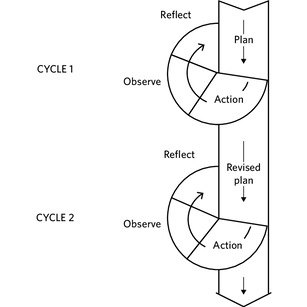|
Definitions
|
The action research approach:
"Action research involves taking a self-reflective, critical and systematic approach to exploring your own teaching contexts." (Burns, 2010, p. 2) Action research is a strategy for "reflecting on your teaching [...] done by systematically collecting data on your everyday practice and analysing it in order to come to some decisions about what your future practice should be" (Wallace, 1998, p. 4). What this means in practice... ... a combination of action (an intervention) and research (collecting and reflecting on data): "A central aspect of action research is the simultaneous focus on action and research. The action component involves participants in a process of planned intervention, where concrete strategies, processes or activities are developed within the research context. [...] The research element of action research involves the systematic collection of data as planned interventions are enacted, followed by analysis of what is revealed by the data, and reflection on the implications of the findings for further observation and action" (Burns, 2005, pp. 58-59). |
Principles |
|
Types of action research |
Common types of action research referred to in language teaching are:
|
References |
|

